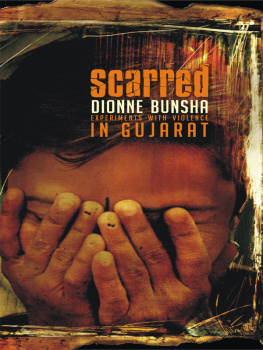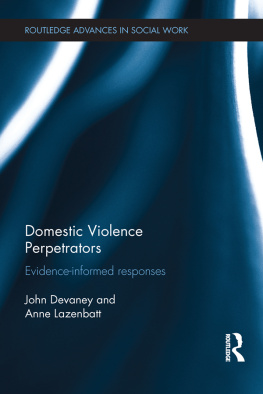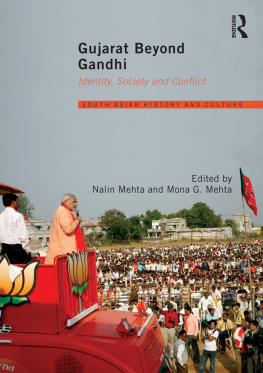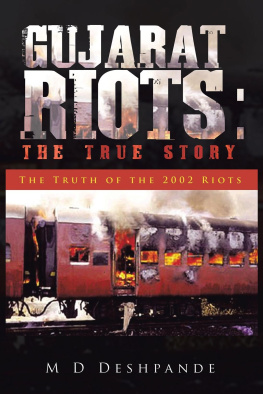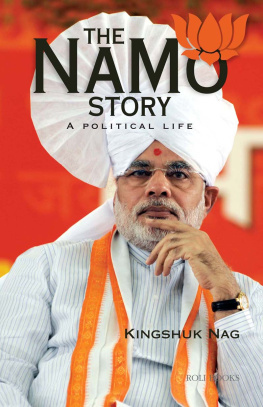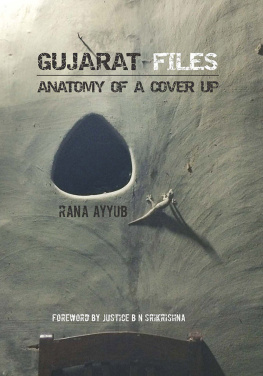DIONNE BUNSHA
Scarred: Experiments with Violence in Gujarat

PENGUIN BOOKS
PENGUIN BOOKS
Published by the Penguin Group
Penguin Books India Pvt. Ltd, 11 Community Centre, Panchsheel Park, New Delhi 110 017, India
Penguin Group (USA) Inc., 375 Hudson Street, New York, New York 10014, USA
Penguin Group (Canada), 90 Eglinton Avenue East, Suite 700, Toronto, Ontario, M4P 2Y3, Canada (a division of Pearson Penguin Canada Inc.)
Penguin Books Ltd, 80 Strand, London WC2R 0RL, England
Penguin Ireland, 25 St Stephens Green, Dublin 2, Ireland (a division of Penguin Books Ltd)
Penguin Group (Australia), 707 Collins Street, Melbourne, Victoria 3008, Australia (a division of Pearson Australia Group Pty Ltd)
Penguin Group (NZ), 67 Apollo Drive, Rosedale, Auckland 0632, New Zealand (a division of Pearson New Zealand Ltd)
Penguin Group (South Africa) (Pty) Ltd, Block D, Rosebank Office Park, 181 Jan Smuts Avenue, Parktown North, Johannesburg 2193, South Africa
Penguin Books Ltd, Registered Offices: 80 Strand, London WC2R 0RL, England
First published by Penguin Books India 2006
Copyright Dionne Bunsha 2006
Cover photograph by Ami Vitale
Cover design by Nitesh Mohanty
All rights reserved
ISBN: 978-01-4400-076-0
This digital edition published in 2013.
e-ISBN: 978-81-8475-897-9
This book is sold subject to the condition that it shall not, by way of trade or otherwise, be lent, resold, hired out, or otherwise circulated without the publishers prior written consent in any form of binding or cover other than that in which it is published and without asimilar condition including this condition being imposed on the subsequent purchaser and without limiting the rights under copyright reserved above, no part of this publication may be reproduced, stored in or introduced into a retrieval system, or transmitted in any form or by any means (electronic, mechanical, photocopying, recording or otherwise), without the prior written permission of both the copyright owner and the above-mentioned publisher of this book.
PENGUIN BOOKS
SCARRED:
EXPERIMENTS WITH VIOLENCE IN GUJARAT
Dionne Bunsha is a Special Correspondent with Frontline, one of Indias most respected newsmagazines. She has won three journalism awards for her reportage on the Gujarat violencethe Sanskriti Award, the Peoples Union for Civil Liberties Human Rights Award, and the International Federation of Journalists Tolerance Prize for South Asia, 2005. Dionne studied for a Masters degree in Development Studies at the London School of Economics in 1999-2000, and completed a diploma in Social Communications Media at the Sophia Polytechnic, Mumbai, in 1995.
For the people who died in vain, the people who
survived and fought the fear, the people of Gujarat who
will overcome the barriers that divide them.
My family: Victy, Russi, Rhea and Nana Ratty.
27 February 2002:
A compartment of the Sabarmati Express from Varanasi to Ahmedabad was set on fire at 8.05 a.m. after a fight at the Godhra station platform between Hindutva activists travelling on the train and a Muslim tea vendor. Fifty-nine people were killed in the clash. Several activists of the fundamentalist groups, the Vishwa Hindu Parishad (VHP) and the Bajrang Dal, were in the train on their way back from a ceremony to build a temple at the disputed site of the demolished Babri Masjid in Ayodhya.
28 February 2002:
During the VHP bandh the next day, mobs targeted Muslims in Ahmedabad, Vadodara and villages in 20 of Gujarats 26 districts, mainly in north and central Gujarat. More than 1000 people were killed.
The violence continued for three months in some places. Refugees were stuck in relief camps for many months afterwards.
Three years later:
Many refugees cannot return home.
The culprits remain unpunished.
Muslims and Christians in Gujarat still live in fear.
The golden rule of conduct is mutual tolerance, seeing
that we will never all think alike and we shall always see
truth in fragment and from different angles of vision.
Mahatma Gandhi
Foreword
28 February 2002a day which I will never forget. I pray for all those who were killedchildren, young girls; so many who lost their lives even before they could figure out what had happened to them. Young boys and girls who left their homes to play in the neighbourhood would never see their parents and relatives again. Mothers searched for their children in the commotion, and many still dont know whether their children are alive or dead. They are still waiting. There was not enough time to react. Indifferent government statistics can never account for those lakhs of people who died silent deaths, and are still suffering today.
When I go back in my mind to that awful day, my thoughts circle the same path and always come back to where they started. What happened, and why? I, and indeed many others like me, are still unable to come to terms with what happened.
During the 1969 riots in Ahmadabad, wemy children, relatives and neighbours spent months in a relief camp set up by the government after our houses were burned in Chamanpura, next to Gulbarg Society. We were not afraid to go back and establish Gulbarg Society which was under construction, as people still had faith in their neighbours and family friends. We could distinguish our friends and foes in the establishment and organizations. But today when we narrate our story, we come across a different environment. There are many whose arguments are aimed at justifying the death and destruction which took place.
Whenever I remember the attack on us, I wonder why Jafrisaab didnt climb up on the roof. Why didnt he take shelter in another house or flat? Why didnt he hide? The whys dont end. I just dont have an answer for these questions. What made him confront the killers? He knew death was waiting for him, and he opted for it. I have tried to comprehend and make sense of the events of that day, and how it changed our lives forever.
This book is a great tribute to those who have undergone unimaginable suffering, and is an excellent attempt to provide a place in history to those known and unknown victims who lost their life in Gujarats communal riots in 2002. How many of those who died in Ahmedabads horrific riots of 1969 do we remember? The events narrated and the views of those who were responsible for protection and administration gives an accurate account of the feelings of the sufferers, rioters and their abettors.
No amount of patience can bring what we have lost back to us. The very least we expect by way of consolation is justice, however delayed. I pray that all those who read this book will take a vow to wipe out hate and jealousy from their hearts to prevent such ghastly events from happening again.
September 2005 | Zakia A. Jafri |
Zakia A. Jafri is the widow of the late Ahsan Jafri, an ex-member of parliament (Congress) who was lynched by a mob outside his house in Gulbarg Society in Ahmedabad during the riots. Gulbarg Society saw one of the worst communal attacks in Gujarat, in which more than fifty-nine people were killed and many others attacked and injured. None of Gulbarg Societys residents have managed to return home. Mrs Jafri now lives in Surat with her son, Tanvir.
Authors Note

